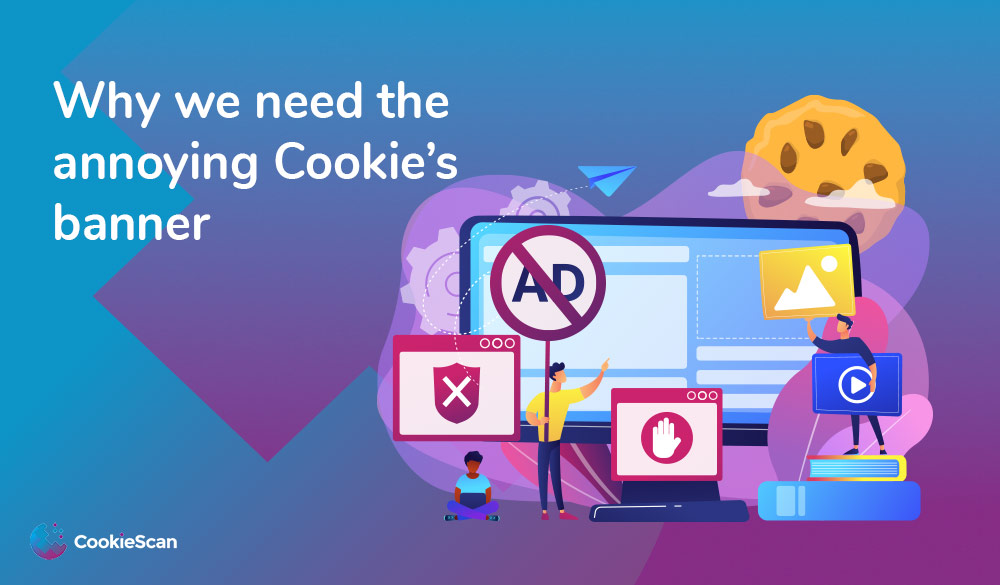
Everyone when they visit a website for the first time sees the cookie banner pop-up and either ignores it (if you can), clicks it as fast as you can, just to get rid of it or reads it to actually see what is say.
Some people see it as a total annoyance, an unnecessary compliance burden made to just get in the way and others see the real benefit of it, as protection our rights and our information.
So, which one are you, and is it necessary?
What is the purpose of a Banner?
The cookie banner is designed to inform us all that the website uses cookies.
I am not going to go into what a cookie is, but I will go as far as to say we are not talking about the chocolate chip type cookies, none of us would complain about.
The banner tells us they are there and should tell us what cookies are being use, who put them there, what they each do and how long they will stay active on the device once they are allowed to be loaded onto it.
The banner will also allow us to choose whether we give our consent to allow certain types of cookies to be loaded onto our device or not.
So, the banner does quite a lot of things in our favour, so why do we feel so annoyed about it all the time?
What else can it do?
The banner is limited by most cookie management platforms to just the cookie information, some are very limited and will not even tell the site user what cookies are being used, they just expect the site visitor to consent to a category of cookie without being informed about what cookies they are using, or what they do.
Some just say ‘Accept’ and don’t even categorise the cookies, so there is a lot of inconsistencies out there which leads to a lot of confusion.
The cookie banners that provide the information the law requires them to and comply fully with the law, which are PECR and the ePrivacy Regulation end up looking complicated, so annoy the site user.
Maybe this is the issue, the non-compliant banners are causing the problems, not the compliant ones.
CookieScan™ has taken the use of the banner one step further!
Your Data Protection Rights.
Under the Data Protection Laws, as a ‘Data Subject’ you have several rights:
- Right to Access
- Right to Rectification
- Right to Object to Processing
- Right to Erasure
- Right to Restriction of Processing
- Right of Data Portability
And under the CCPA you have the:
- Right to prevent the sale of your data
CookieScan™ has given a method to enforce these rights using the banner – How cool is that.
The cookie banner is there to protect people from the misuse of their data. Imagine is it was not there, and cookies were just loaded onto devices without regulation.
People would be bombarded with adverts, their search terms would be recorded and interrogated by companies so direct marketing could be used all the time.
People’s information and internet profiles could be sold off to companies and used in all sorts of ways. It would be a nightmare.
The banner helps to prevent all of this from happening.
The UK is currently looking at getting rid of the use of banners and just allowing the unfettered use of cookies, so the above could be true.
But banners would still be required for companies doing business within the EU, USA and other global countries with privacy laws that include the use of tracking tools such as cookies.
So, it would make it even more confusing for the users.
People need to start realising the value of their own information.
Banners are protecting that by:
- Providing the information needed to make informed decision about allowing the cookies to be loaded onto their devices
- Telling website users what cookies are being used on the website they are visiting
- Telling the website visitor what the cookies do
- Telling the website visitor who is providing the cookie, Facebook, YouTube etc.
- Telling the website visitor how long the cookie will remain active on their device, if they allow it, and
- Telling the website visitor what category the cookie belongs too, Essential, Marketing, Statistic, Preference or Unclassified
If you use CookieScan™ as your cookie management platform, the website visitor also gets:
- An updated Cookie Notice, telling them exactly what cookies do and what are on the site, at that moment
- A method to enforce one of their data protection rights, directly to the Data Protection Officer, Manager or Lead for the website company

